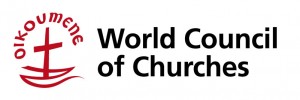We at Occupy World Writes don’t write very often about religious organizations. We report abuses by various governments and groups who claim to be guided by religious principles, but it’s very seldom that we write about an actual religious organization. It’s not that we’re anti-religion (we definitely aren’t that); we just feel that it’s not our place to comment. Today’s post is one of those rare exceptions.
 On July 10, the World Council of Churches, a global coalition of 345 churches representing over half a billion Christians, announced that they would pull all of their investments out of fossil fuels, saying that those investments were no longer ethical. The Council’s finance committee report stated: “The committee discussed the ethical investment criteria, and considered that the list of sectors in which the WCC does not invest should be extended to include fossil fuels.”
On July 10, the World Council of Churches, a global coalition of 345 churches representing over half a billion Christians, announced that they would pull all of their investments out of fossil fuels, saying that those investments were no longer ethical. The Council’s finance committee report stated: “The committee discussed the ethical investment criteria, and considered that the list of sectors in which the WCC does not invest should be extended to include fossil fuels.”
350.org founder Bill McKibben made a statement applauding the move, saying: “The World Council of Churches reminds us that morality demands thinking as much about the future as about ourselves–and that there’s no threat to the future greater than the unchecked burning of fossil fuels. This is a remarkable moment for the 590 million Christians in its member denominations: a huge percentage of humanity says today ‘this far and no further.’”
The WCC is just the latest religious organization to divest themselves of fossil fuel investments. The United Church of Christ passed a fossil fuel divestment strategy in June of last year, and both New York City’s Union Theological Seminary and the Unitarian Universalist Association voted to do the same last month.
It’s not clear if Thursday’s decision only applies to the finance committee or to the member churches as well. For example, the Church of England said it could not yet comment on what the decision meant for its own investments.
Occupy World Writes applauds the WCC and other religious organizations that have taken this step. By recognizing the ethical conflict implicit in those investments, these organizations have proven that they can change and adapt to the times while preserving their moral character. When the Union Theological Seminary’s decision was published, the seminary’s president, Serene Jones, said: “Scripture tells us that all of the world is God’s precious creation, and our place within it is to care for and respect the health of the whole. Climate change poses a catastrophic threat, and as stewards of God’s creation we simply must act.”
Amen to that…

